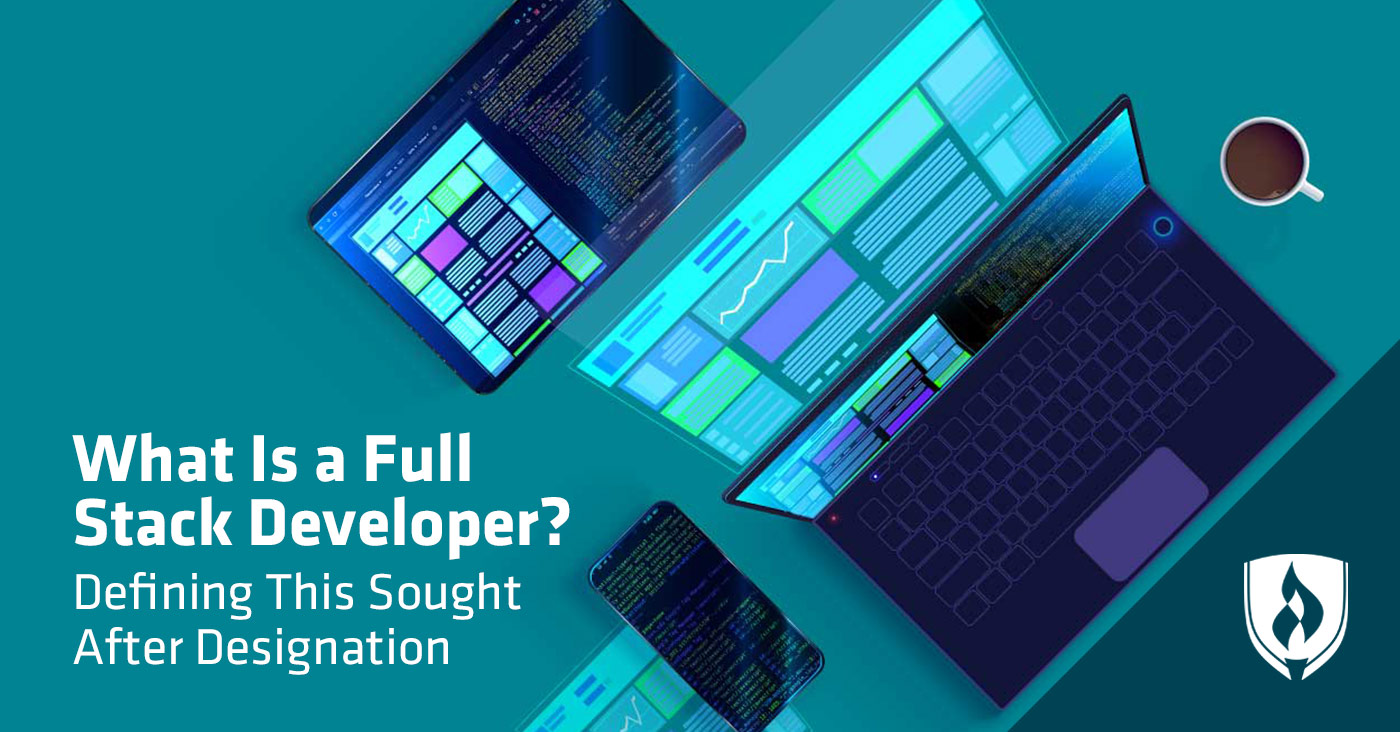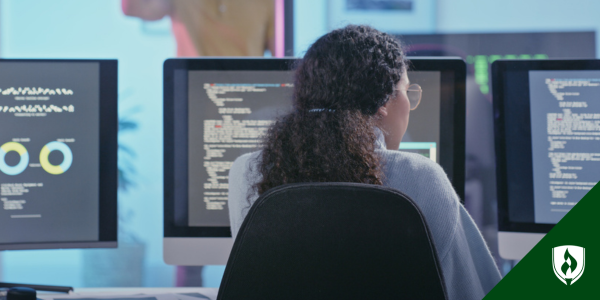What Is a Full Stack Developer? Defining This Sought-After Designation
By Ashley Brooks on 03/02/2020

Technology careers are commonplace in this digital age. It seems that every time you peruse job boards you find employers looking for skilled developers and programmers. You have an idea of what it takes to become one of these tech pros, but you need more information about what these careers entail.
“Full stack developer” is one designation that comes up over and over again in your job search. What exactly does it mean to be a full stack developer? Does that mean there’s a half stack developer somewhere? Is that a silly question? No one wants to look foolish—so let’s get it figured out.
Join us as we gain expert insight into what full stack developers do and how their work fits into the technology field as a whole.
What is a full stack developer?
You’ve maybe heard of back-end developers who work with code that runs behind the scenes, and front-end developers who work with the code that creates the websites and apps users see as the final product. The simple explanation is that full stack developers are the skilled programmers who can do both.
“A full stack developer is a software developer that has skills across most, if not all, areas needed to create a software product,” says Michael Frederick, co-founder and CEO of Flatirons Development. “Typically it is used in the context of web applications, where you are required to write backend code, integrate with a database, and write HTML/CSS on the front-end that integrates with your backend code.”
These tech professionals have a broad range of skills and programming languages, making them a valuable asset for many companies. “Full stack engineers can be a more desirable resource for certain organizations as they cover the larger gambit of technologies,” Frederick says.
What does a full stack developer do?
Full stack developers use their extensive knowledge to create, develop and troubleshoot various projects for their employer or clients.
“A full stack developer is involved in the entire process of getting features deployed into production,” says Adam Hill, full stack developer at The Motley Fool and technical lead at The Blueprint. He shares that this often starts with a new feature request for an app, changes in database functionality or maintenance on websites.
Although full stack developers have the skills to handle many types of development projects, that doesn’t mean they’re working alone! “Most modern software developers will be embedded into a team that consists of other developers and product managers,” Frederick says.
These team members collaborate to make sure projects stay on budget, use clean and consistent code, and meet the clients’ needs and design specifications.
What skills does a full stack developer need?
There are plenty of technical skills that full stack developers need to be familiar with, including a variety of coding languages. Shahid Hanif, CTO of Shufti Pro, shares these technical skills that come in handy for full stack developers:
- Front end languages like HTML, CSS and JavaScript®
- Back end languages like Python®, Ruby, Java® and PHP
- Database technology like Oracle®, SQL and MongoDB®
- Strong project management skills
However, technical prowess isn’t the only thing that matters in the programming world. “Soft skills, when complemented with strong technical skills, will get you very far,” Frederick says. “Being able to communicate well, mastering the art of estimation, and being able to collaborate with other engineers and other team members is a huge plus for any developer.”
Hill explains that these are some of the soft skills that full stack developers will need in the workplace:
- Curiosity and a desire to learn, so that they can keep up with the ever-changing tech industry
- Problem solving, so that they can see situations from different angles to arrive at the best solution
- Communication skills, to make for easier collaboration with team members
It’s also important to keep in mind “full stack” is a pretty subjective term without a clear finish line—there’s always more to learn and master.
How do you become a full stack developer?
There isn’t one single path to become a full stack developer. “Software engineering is a field where there are not many gatekeepers—there aren't any required credentials or regulating bodies like many other professions. All that is required is a curiosity to learn about web development and the determination to keep improving,” Hill says.
There are traditional degree programs, special coding bootcamps and opportunities to be self-taught through passion projects. With so many options, where should an aspiring full stack developer start? Although taking on personal projects is a good way to dip your toes into a new programming language, a degree program is often the most natural next step.
“A classic four-year computer science degree will teach you a lot of things that you won't get in a bootcamp,” Frederick says. “The best candidate to me is someone that has a four-year degree that covers numerous areas of computer science, but also ensures that they have taken classes that focus on the market they are interested in.”
When it comes time to go on the job hunt, a degree can go a long way toward impressing employers. Hanif shares that he looks for a degree in computer science as a way to sift resumes, along with relevant programming languages and project management skills.
Developing your technology career
What is a full stack developer? Thanks to these expert answers about this tech career, you now have a better understanding of what it means to work as one of these skilled technology pros—and what it takes to get closer to being considered one.
If you’re ready to start developing your technology career, learn more about the job titles that could be yours with these “9 Programming Careers for Coding Connoisseurs.”
Oracle, Java and JavaScript are registered trademarks of Oracle Corporation.
Python is a registered trademark of The Python Software Foundation
MongoDB is a registered trademark of MongoDB, Inc.




